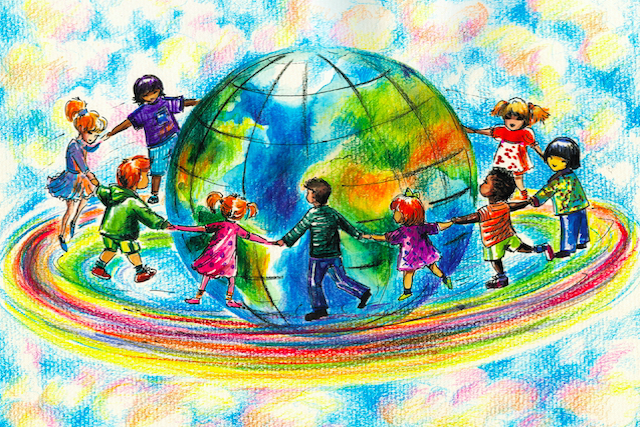
“I’ve learned that you shouldn’t go through life with a catchers mitt on both hands. You need to be able to throw something back.” ~Maya Angelou
Being charitable is often seen as a zero sum game, giving away our time or money for the benefit of others. As uplifting as it may be to give to a cause you care about, most of us feel we lack the authority to truly make things happen.
I discovered the transformative power of helping others when I was eight years old. My friends and I had imaginations like other children, but in the summer of 1989 our ideas became action—we organized an event to raise money for a local leukemia charity.
Every day, on a patch of grass by the river, in the shadow of a 10th century abbey, my friends and I would play soccer. As it was the summer holiday and we had never stayed up all night, we conceived of a marvelous plan to organize a sponsored, all-night soccer match.
What we lacked in official charity affiliation, we made up for in enthusiasm. We walked for miles, knocking on every single door to obtain sponsors for our unconventional soccer match. We asked anyone that sponsored us how many goals we’d score during the night. The person who came closest would win a signed ball from the local professional soccer club.
Within two days we managed to collect over 100 pounds in sponsor funds. More importantly, we had planted a seed in ourselves, a raison d’etre.
People arrived to show their support, cheering with each goal that we scored well into the balmy summer evening. As the sun set, only we kids were left, with my dad as the sole spectator. Our motivation never waned as we played into the early hours of Sunday morning.
The pride and sense of achievement we gained from helping that leukemia charity led me to a profound realization: Positively impacting others is far more meaningful than the satisfaction of a personal goal that wears off after a day.
Time after time I hear people say that either a lack of time or money prevents them from volunteering or donating to a cause. It isn’t that they don’t care; it’s just that they don’t feel empowered to actually do anything. After hearing this collective frustration from so many people who wished they could do more, I decided to compile this list.
What if there were various ways you could help others without sacrificing your already-tight budget or precious free time? Below are six small changes you can make in your daily life that have a stunning social impact over time.
1. Amazon Smile
As the light of the laptop glows upon my face and the dopamine rush of retail therapy hits, my late night Amazon shopping spree is an unexpected source of social good. With their low prices and free two-day Prime shipping, Amazon is my go-to source when shopping online.
Over 250 million people use Amazon, but only a fraction use Amazon Smile, a simple and automatic way to support your favorite charity. When you shop through smile.amazon.com, you’ll find the same selection and low prices with an added bonus: Amazon will donate 0.5% of the price of your purchases to your favorite charity. The donation is automatic after checkout.
Over the past twelve months I have spent an embarrassing $2,800 at Amazon, and often, when buying impulsively, I would forget to visit smile.amazon.com. But since installing a Google Chrome extension, I am automatically redirected to smile.amazon.com when I click on any Amazon link or navigate to amazon.com in my browser.
Annual Impact: $2,800 x 0.05 = $14
2. Charity Miles
Most of us walk, some of us run, while others prefer to cycle. What if we could not only improve our health from daily exercise, but also do social good as we sweat? Over the past few years I have been on a quest to run a marathon on every continent to help raise awareness and funds for refugees, and the Charity Miles app has helped to multiply my fundraising efforts.
Charity Miles sends money to a charity of your choosing for each mile that you walk, hike, run, or cycle. Simply download the app for your Android or iOS device, select a charity, and then perform your exercise as you normally would.
The charity that you select earns money for every mile completed. Walkers, hikers, and runners earn $.25 per mile; bikers earn $.10 per mile. The app even has an indoor mode if you prefer to use the treadmill.
Total Effect = 1,200 miles of running = $300
600 miles of walking = $155
600 miles of cycling = $60
Annual Impact: $515
3. GoodSearch.com
The most common online activity besides browsing social media is searching. We use search engines to help us at work, with our personal lives, when shopping, and in just about every scenario imaginable. Search engines are how we find information.
GoodSearch is touted as a philanthropic search engine. Instead of instinctively heading to Google, start using GoodSearch instead and contribute to the millions of dollars already raised for charity. To remember to do this, just replace Google as your browser’s default homepage. In addition, shopping through GoodShop allows you to donate to charity just like Amazon Smile does.
Annual Impact= 5 searches a day x 365 = $18.25
4. FreeRice.com
Brain-training games have become a big business over the past few years with companies such as Lumosity and Elevate dominating the niche. But rather than paying money to exercise your brain, flex your neurons and help a charity at the same time with FreeRice.com.
For each question you answer correctly, Freerice.com donates ten grains of rice to the World Food Programme. The game is surprisingly therapeutic. It helps me to decompress after a long day, and it allows me to multitask: learning new information while effortlessly donating to charity. After just five minutes of game-time I earned 750 grains of rice for the World Food Programme.
Annual Impact: 750 x 365 = 273,750 grains of rice or 9.4lbs
5. The Hunger Site
The Hunger Site allows users to donate food by simply clicking a button! No actual donation is required. Simply click the yellow button on the main page and repeat daily. After clicking you can see the results for that day – including how many people clicked and how much food was donated in kilograms, tons, and pounds.
Annual Impact: 0.14 lb x 365 =51lbs of Food
6. Satorio.org
The growing body of evidence supporting meditation has already been widely publicized by mainstream media outlets. Not only can meditation reduce stress, anxiety, and blood pressure, but it can also boost creativity, focus, and the immune system.
Using Satorio.org, you can obtain these benefits while simultaneously helping to end world hunger—no effort or money is required.
When you start hitting the gym, you observe small improvements and gradual changes along the way. The same is true with meditation. It is a workout for your mind that can have ripple effects on your life and the people around you. The idea behind Satorio is to show, in a more tangible way, the beneficial impact that your meditation can have on others.
By meditating for twenty minutes a day, you give 73,000 grains of rice to Oxfam annually:
Annual Impact: 20 x 10 x 365 = 73,000 grains of rice or 2.5lbs
7. Forest
As you are reading TinyBuddha, you no doubt appreciate the art of being mindful with your time. Forest, an app I started using recently, not only helps me be more mindful, but also increases my productivity massively.
Forest encourages you to resist the temptation of leaving the app to check Facebook, text, or to play a game, by making your virtual tree wither away when you do. The Tamagotchi sense of achievement I get from nurturing my forest, motivates me to stay away from the distracting element of my phone when I am supposed to be working.
I would gladly pay the $1.99 for the app’s productivity boost alone; however, the added social benefit are the real trees that are planted after achieving certain milestones.
Total Effect:
2 x 25 minutes sessions per day = 2 trees planted a year
—
Over the course of a year, using these websites can provide $547 and over sixty pounds of food. Imagine how many millions of people would be fed and helped if even 1% of the world did this.
So if you’ve been stuck in a defeatist mindset, assuming there is nothing you can do, think again. These incredibly simple efforts can fuel positive change and support programs that save lives around the world.
About David deSouza
David deSouza is the Co-Founder of Satorio.org, a social enterprise that has helped over 10,000,000 people, develop the habit of mindfulness. For each minute the Satorio community meditates, Oxfam receives ten grains of rice. David also created the Mindfulness Journal, a pocket-sized notebook to help you meditate for 30 days straight. He can be found on Twitter, Facebook and Instagram.
- Web |
- More Posts













 Though I run this site, it is not mine. It's ours. It's not about me. It's about us. Your stories and your wisdom are just as meaningful as mine.
Though I run this site, it is not mine. It's ours. It's not about me. It's about us. Your stories and your wisdom are just as meaningful as mine.
Happy Friday David!! I just shared your article on my FB page — this is a fantastic list! I use Amazon Smile but will be signing up for others as well — it’s a really great way to make impact — thank you!
Dee, Thank you so much for sharing the article on Facebook. I hope you are your friends found it useful. What charity do you donate to with Amazon Smile?
Inspiring article- don’t forget charity shops there’s double benefit here- the buyer who gets quality goods cheaply and the charity and remember if you’re a U K Tax Payer you can gift aid donations ( goods or cash ) making them worth 25% more to the charity. Remember too to Recycle as much as possible for the good of all.
Sian, excellent point. Thank you for taking the time to comment and to provide that tidbit.
In regards to the Amazon Smile part, there’s something I’d like to point out– I don’t mean for these to sound harsh, just a bit of a logic-check.
Yes, shopping through that gives a menial amount of the purchase price to charities, but the purpose of “retail therapy” is to feel good by spending money, right? If you evaluate what you actually *need* and only get that, and save the rest of the money to donate directly to the organization, you’ll do a lot more good with the exact same amount of money.
Personally, I’d suggest cutting out all “retail therapy”, but I also don’t believe in buying just to feel good. Everyone has their own forms of enjoyment, so I’m just saying use some logic with this.
The other suggestions are fantastic and I definitely think those are good choices to put on the list. It’s just Amazon-anything that I advise people to stay away from… It’s too easy to find something else that’s good in the moment but you don’t *actually* need. Staying off there saves more money than you’d expect, and that can go directly to the charity to do phenomenal amounts of goodness.
*this, not these
Hi Matt. Thanks for commenting and your wise words. I agree, shopping should be mindful. We waste so much money by mindlessly buying things and if this money can be used to donate to charity, even better.
The idea with Amazon Smile is to make your purchases have a silver lining. Not all purchases from Amazon are indulgent, many people use Amazon for household items. If these purchases can help a charity, I think that is an amazing bonus.
Thank you for taking the time to read the article and for commenting.
Since I already meditate I’ll definitely check out Satorio. All great suggestions here and thanks for the reminder that giving in small ways is always powerful.
Rick, I would love your feedback about what you think of Satorio if you use it. Thanks for taking the time to comment.
David, I did try it, I do like it, only thing is there’s no alert when the timer hits zero, or am I not setting it up right? I think once you app out, that will be great.
Thanks for trying it out. That’s strange there should be an alert at the end. Let me troubleshoot. Thanks for pointing this out.
This is such a positive and timely reminder that it doesn’t take much time or money to practice Being The Change. Thank you so much for sharing!
You are more than welcome. If only a small percentage of people implement one of the ideas, it can have a huge impact. Thank you for taking the time to comment.
Charity really hurts – Rocky Balboa.
Love this, I feel like every small contribution counts! Have you ever heard of http://www.beanbeanbean.com? I think it would be an excellent addition to your list.
Such a nice blog. Thanks!!
Great page guys. Good stuff. Keep up the good work, thanks so much for this